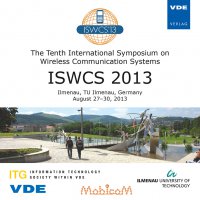Comparison of linear and widely linear processing in MIMO-FBMC systems
Konferenz: ISWCS 2013 - The Tenth International Symposium on Wireless Communication Systems
27.08.2013 - 30.08.2013 in Ilmenau, Deutschland
Tagungsband: ISWCS 2013
Seiten: 5Sprache: EnglischTyp: PDF
Persönliche VDE-Mitglieder erhalten auf diesen Artikel 10% Rabatt
Autoren:
Caus, Màrius (Department of Signal Theory and Communications, Universitat Polit`ecnica de Catalunya, Barcelona, Spain)
Perez-Neira, Ana I. (Centre Tecnològic de Telecomunicacions de Catalunya, Castelldefels, Spain)
Inhalt:
This paper carries out a comparison between two multi-stream techniques aimed for filter bank multicarrier (FBMC) systems based on the offset quadrature amplitude modulation (OQAM). The first option performs linear processing (LP) and, therefore, it does not take into account the non-circularity property of the transmitted symbols. The second technique considers the FBMC specificities and performs widely linear processing (WLP). With the aim of predicting which solution gives the best performance we have conducted a theoretical analysis that reveals that the technique based on the LP is able to achieve the lowest sum mean square error (MSE) at high SINR in channels with high coherence bandwidth. This holds true when the number of streams (S), and the number of transmit antennas (NT) and receive antennas (NR) are related as follows S = NR = 3, NT = NR. The numerical results show that the LP also gives the best performance in terms of BER if the aforementioned inequality is satisfied and the channel coherence bandwidth is substantially larger than the subcarrier spacing. If not, then the LP exhibits an error floor and the WLP may give better performance, especially at low noise regime.


